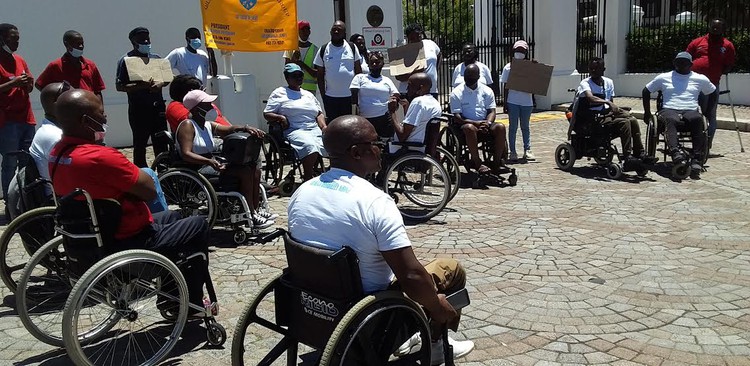
8 December 2021
People with disabilities from Khayelitsha and Langa went to Parliament demanding better access to transport, jobs and houses. Photo: Nombulelo Damba-Hendrik
About 30 people living with disabilities from Khayelitsha and Nyanga went to Parliament on Tuesday demanding better transport, housing and jobs.
The protesters, from the Qhakaza Disability Group, said the government had forgotten about them.
Wheelchair user Peterson Dhlamini rents a one room shack in Nyanga East, which he says is not suitable for him. “The shack is at the back of the house. The toilet is small and it is outside,” said Dhlamini.
He said he is not working and relies on a R1,800 social grant.
“On that R1,800 I have to pay rent for R500 and buy food. Then I am left with little money. Using that money I still have to go to hospital now and then for check-ups. That’s another struggle because I cannot afford to hire a car. I’m forced to take a taxi,” said Dhlamini.
He said taxi and bus drivers often fail to help passengers with disabilities. “Our drivers are not patient. You get to a taxi using a wheelchair; the driver will never assist you. The only people who assist are passengers, and sometimes they are rushing to work and don’t have time.”
“We want the government to educate taxi drivers how to take care of people living with disabilities. We also demand transport that will cater for our needs and is accessible,” he said.
Siyabonga James, also from Nyanga East, has been using a wheelchair since he was shot 25 years ago.
“In my area there’s a housing project which started years ago. Not a single person living with disability from my area received a house. I know this because we are only two people with disabilities in that area and we have been watching people moving into those houses,” said James.
“I’m 50 years old now with a wife and kids but still living in a backyard room because I cannot afford to buy myself a house.”
“Government will offer a learnership for people living with disabilities but not provide transport, meaning those who take the learnership must find their own transport. To hire a car from Nyanga to town costs R400 return and those are things that exclude us from learnerships,” said James.
James said disabled people are not given opportunities to work.
“If the government can create a centre for us to fix our own wheelchairs when they are broken we would appreciate that because a lot of people with broken wheelchairs are stuck at home doing nothing.”